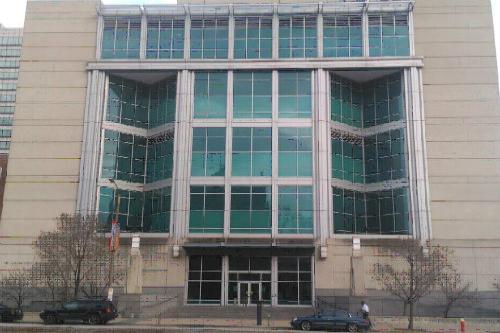Dozens of people incarcerated at St. Louis City Justice Center (CJC) protested inhumane and life-threatening conditions on February 6 by gaining control of a section of the jail. Smashing windows and holding up signs fashioned out of food trays, they broadcast some of their demands to the outside world. Those demands included an end to abuse at the hands of CJC officials and an improvement to the overall living conditions, especially relating to COVID-19 safety protocols.
The uprising began around 2:30 am with a fight between a detainee and a corrections officer, CJC Public Safety Director Jimmie Edwards said at a news conference later that morning. The incident escalated after some detainees “jimmied” the locks on their cells, gained access to the unit and released other people from their cells. Afterwards, the protesters set various objects on fire and threw them out of windows, according to local news station KSDK.
While Edwards said that the people involved in the uprising did not make any demands, photographic coverage of the event contradicts that claim.
Included on the signs that the incarcerated participants displayed were messages such as “What about Anthony Smith” and “Free 57.” Smith, 24-year-old Black man, was fatally shot by then-St. Louis police officer Jason Stockley in 2011. Six years later, a judge found Stockley not guilty of first-degree murder.
“Free 57” is a reference to the 57 incarcerated people who took part in a December protest at the jail “and were punished and placed into different conditions,” Latrell Stanton, a leader with Ex-Incarcerated People Organizing St. Louis (EXPO-STL), a group that advocates to end mass incarceration, told Filter.
The uprising “was the natural evolution of the actions of living and feeling human beings” and took place “because of inhumane treatment by CJC Management concerning Covid-19 along with other issues,” EXPO-STL wrote in a Facebook post that morning.
The protest was the third time in as many months that people incarcerated at CJC undertook some form of civil disobedience. On December 29, 2020, detainees protested conditions at the jail by refusing to return to their cells. On January 1, 2021, detainees “created a disruption because they refused to be housed with COVID-19 positive inmates,” Lewis Reed, the president of the city’s Board of Aldermen, told the St. Louis Post-Dispatch.
Demands
Cortez Easterwood-Bey, who is currently incarcerated at the city’s Medium Security Institution (known as the “Workhouse”), participated in the December 29 protest. Easterwood-Bey wrote that he and his fellow detainees staged that protest after the complaints and grievances that they submitted went ignored by the correctional officers (COs) at the facility, according to EXPO-STL. Easterwood-Bey also outlined the demands of those on the inside.
“We don’t want to DIE, we are hungry, we want proper ventilation, we are tired of being cold without being given winter clothing, we want proper PPE for COVID-19, we are tired of being price gouged in the commissary and vending machines, we want the mandated six [hours of recreational time] per day, and we want visits from family and friends since there is a glass barrier between them and the inmates,” Easterwood-Bey wrote, according to the EXPO-STL post.
But the COs retaliated against the protesters, using tear gas and sending participants to the “Workhouse.”
Besides the demands mentioned in Easterwood-Bey’s letter, Expo St. Louis is currently calling for third parties—such as health and wellness organizations, elected officials and media members—to be granted transparent tours of CJC and the Workhouse, according to Stanton.
Addressing the conditions at those two facilities in conjunction with each other is crucial, Stanton told Filter, “because the Justice Center, as poor as the conditions are there, is considered to be much better than the Workhouse. The Workhouse is flooded, and has feces.”
Expo St. Louis is also demanding that COVID-19 vaccines be made available to detainees.
Next Steps
On February 7, Expo St. Louis co-sponsored a virtual rally in solidarity with those incarcerated with CJC. Other co-sponsors of the event included the legal advocacy group Arch City Defenders and the Close the Workhouse campaign.
Advocacy group For The People STL also held a demonstration outside of CJC on February 8. At the event, Christopher Winston, an organizer with the group, read an account from a detainee.
“We’re out here today saying this is unacceptable. St. Louis taxpayers’ money should not be used to commit violations of the Geneva Convention and every other human rights law that has ever been passed, and we are not going to stand for it, and nobody else should,” Winston said, according to the St. Louis American.
Rep. Cori Bush (D-Mo.), whose congressional district includes St. Louis, tweeted a response to the protesters: “I want to talk to my constituents in the window. Their lives and their rights must be provided.”
St. Louis mayoral candidates have weighed in on the question of whether the Workhouse ought to be closed, after the city’s Board of Aldermen voted unanimously for closure last year. Three of them provided the St. Louis American with statements in support of closing the Workhouse; a fourth, Andrew Jones, said that “the proposed closure of The Workhouse would be costly.”
The city’s primary election will take place on March 2.
Photograph via City of St. Louis





Show Comments